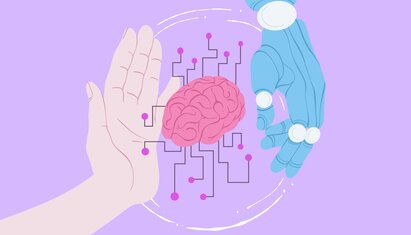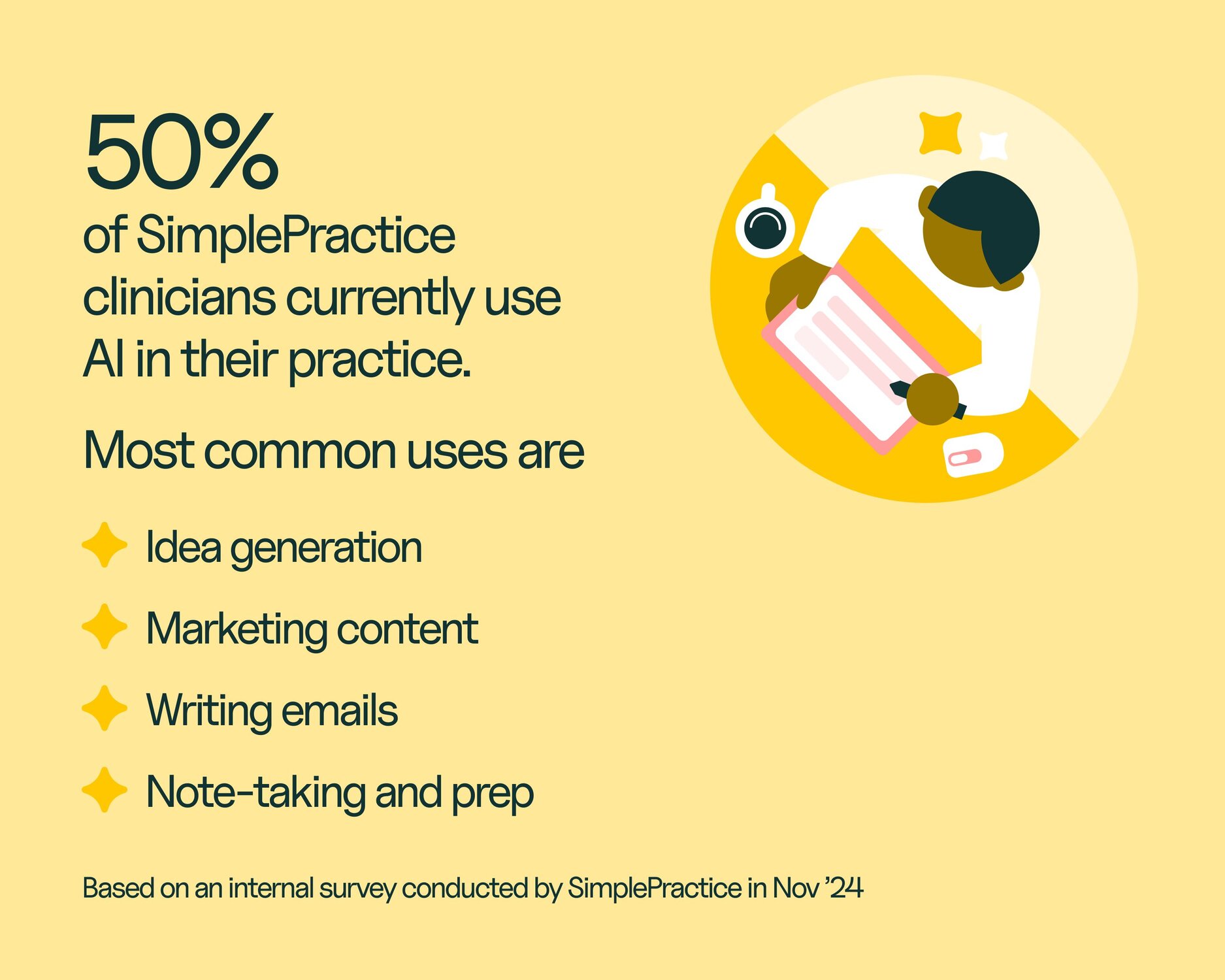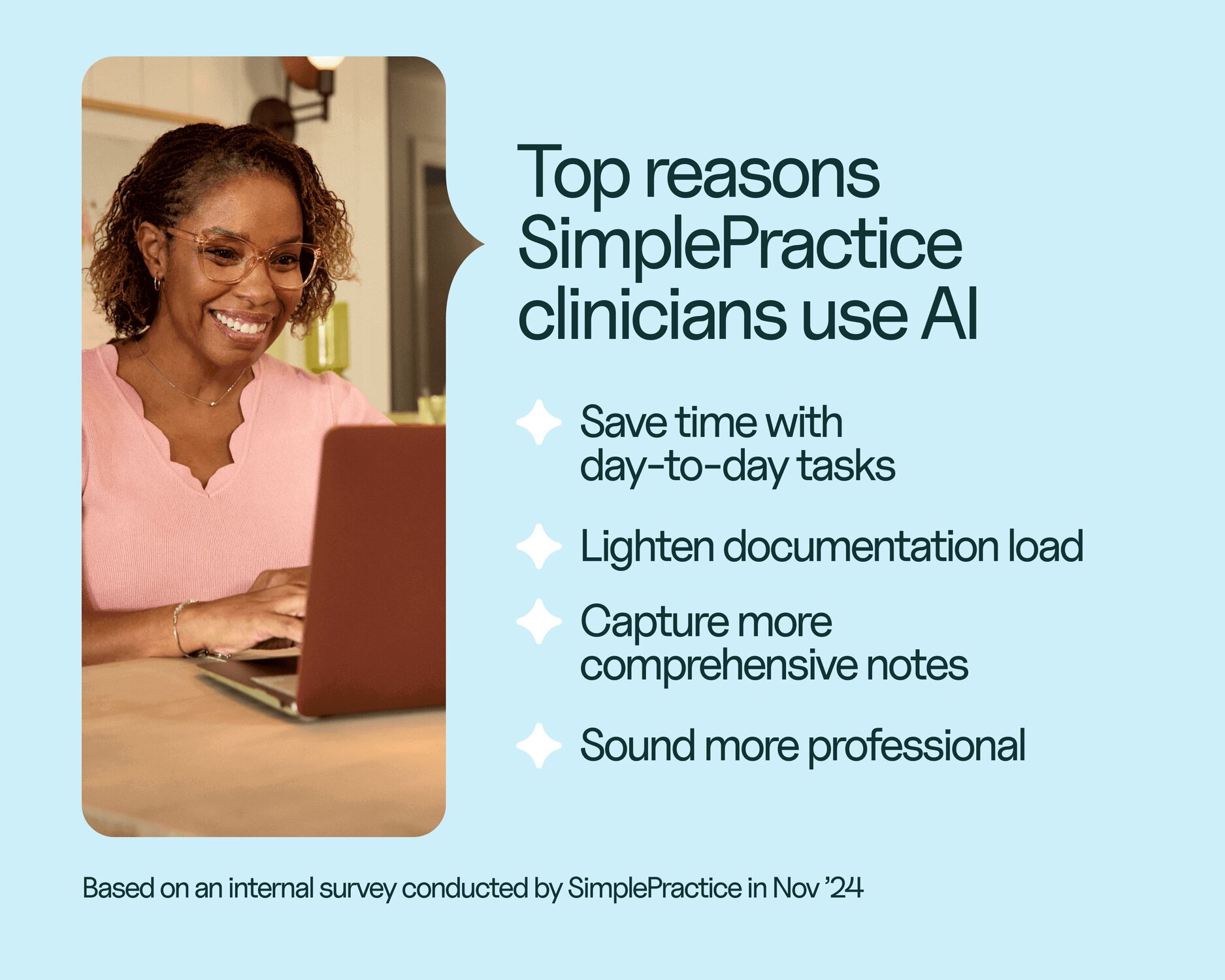The 6 emerging trends shaping therapy in 2026



Published May 23, 2025

As artificial intelligence transforms healthcare, understanding how these tools affect the treatment process becomes essential for both mental health professionals and those receiving care.
This guide offers insights for therapists and clinicians implementing AI as well as for clients and patients wanting to understand how these technologies might impact their treatment experience.
Recent surveys show that over 80% of Americans believe healthcare AI needs additional regulation, highlighting the importance of transparency in mental health practices.
For clinicians: Discussing AI use demonstrates ethical practice, builds trust, and fulfills professional obligations around informed consent.
For clients/patients: Understanding how your information is used, processed, and protected allows you to make informed decisions about your care and maintain control over your personal data.
This transparent approach creates opportunities to address concerns while honoring the therapeutic relationship's foundation of trust.
Before discussing AI with clients, conduct a thorough assessment of your implementation.
Review SimplePractice’s recent CE course on AI Tools to support your practice:
Document AI applications in your practice
Clarify specific purposes for AI and boundaries
Evaluate potential benefits and limitations
Watch for tools that might diminish the human connection
Consider asking your provider:
Which aspects of your care involve AI technologies
How these tools enhance rather than replace human judgment
What safeguards protect your privacy and confidentiality

When introducing AI in your practice:
Begin with client perceptions about AI in healthcare.
Clearly explain how AI enhances your specific services.
Establish clear boundaries on where AI will be used and where it will not be used.
Share your reasoning behind selecting particular tools.
Address privacy concerns with specific security measures.
Emphasize your oversight of all AI-generated content.
Obtain appropriate consent for recording or direct AI interaction.
Document these discussions in your clinical records.
"How does AI technology support our work together?"
"What happens to my information when AI tools are used?"
"How do you ensure AI enhances rather than replaces our relationship?"
"What options do I have if I'm uncomfortable with certain AI applications?"

Let's take a look at how SimplePractice Note Taker works and explore some of the benefits of using Note Taker for both clinicians and clients.
Note Taker uses artificial intelligence to create accurate clinical documentation while keeping clinician decisioning central to the process.
Recording: When activated by the clinician, Note Taker securely captures session audio. The recording can be stopped at any time during the session.
Transcription: After the appointment, the system transcribes the conversation and immediately deletes the original recording.
Note generation: Using the transcript, Note Taker drafts a clinical note reflecting the provider's style and approach. By "looking back" to the clinician’s previous session notes the AI is able to learn the clinician's specific documentation style, preferences, and the types of information they include in their notes. This ensures consistency with the clinician’s approach to documentation.
Clinical review: The clinician reviews, edits, and finalizes the note before saving it to the client’s record. The transcript is then de-identified and de-coupled from the clinician and client.
For clinicians:
Reduces note-taking during sessions
Better captures important clinical details and recurring patterns
More precise documentation of treatment progress
Reduces administrative burden while maintaining quality records
For clients/patients:
Less demands on your therapist during sessions
More accurate documentation of your unique concerns and experiences
Assurance that your provider maintains oversight of all documentation
Recording occurs only when your clinician activates Note Taker during a session. You can request the recording be paused or stopped at any time.
Note Taker is fully HIPAA compliant with HITRUST certification that verifies the strictest level of security compliance. Your personal health information is never sold and remains protected within the platform.
All transcripts and notes are safeguarded with SimplePractice’s comprehensive security measures in alignment with HIPAA regulations and privacy policies.
Only clinicians with authorized access to your profile can view transcriptions and draft notes. Support staff may access data when necessary, operating under strict HIPAA obligations. Transcripts are de-identified and de-coupled from your record after your clinician reviews and signs the note.
Recordings are deleted immediately after transcription, which typically occurs in less than 5 minutes. Once your clinician reviews and signs the note, all identifying information is removed from the transcription data. If notes aren't finalized within seven days, identifying data is automatically deleted.
After you finish recording an appointment with Note Taker, a transcription is generated soon after. A draft note is then generated with the transcription data.
The recording will be deleted immediately after the transcription is generated.
The transcript will be deleted after the note has been locked and signed or seven days after the appointment, whichever happens sooner.
We’re not currently storing any transcripts from the recording beyond this time frame.
We may retain transcription data for customers using Note Taker in the future, but we won’t do this unless we develop a feature that allows you to opt out of session transcript retention.
When we launch this feature, the data from any retained transcripts is de-idenitified and anonymized, which means that any identifying data is completely removed and any association with the client or clinician is deleted.
There will be no PHI that can be traced back to the client or the clinician.
Additionally, the de-identified and anonymized transcription data will be fully encrypted, following regulations, including HIPAA and industry best practices to keep your data safe and secure.
Note Taker, or any other AI-powered functionality SimplePractice may introduce in the future, will be designed to enhance and supplement clinicians’ work. Our mission is to help clinicians thrive, and AI is just another tool we’re using to better support clinicians in their day-to-day job and running their practice.
We strongly believe that trained practitioners are at the center of clinical care, and we’d like to reassure you that only de-identified data from transcripts will be used as a way to continue to improve the SimplePractice Note Taker feature.
Update your practice policies and informed consent documents.
Verify compliance with state-specific recording regulations.
Provide ongoing opportunities for client feedback.
Be prepared to adjust AI use based on individual preferences.
Review your provider's policies on AI use.
Discuss any concerns during your sessions.
Understand your right to opt out of certain AI applications.
Provide feedback about your experience with AI-assisted care.
As AI becomes increasingly integrated into mental health practice, open communication between therapists and clients becomes essential.
By discussing how, when, and why AI tools are used—with careful attention to privacy, security, and the therapeutic relationship—both parties can benefit from technological advances while preserving the human connection at the heart of effective therapy.
Remember that conversations about AI should evolve alongside changing technology and individual needs, creating an ongoing dialogue that supports both clinical excellence and client autonomy.
SimplePractice is HIPAA-compliant practice management software with everything you need to run your practice built into the platform—from booking and scheduling to insurance and client billing.
If you’ve been considering switching to an EHR system, SimplePractice empowers you to run a fully paperless practice—so you get more time for the things that matter most to you.
Try SimplePractice free for 30 days. No credit card required.
READ NEXT: AI for therapists

Jess Barron is SimplePractice's Editor-in-Chief. She's spent the past 25 years working in online journalism, marketing, and digital wellness. Jess's writing has appeared on Yahoo! News, LIVESTRONG.COM, Headspace, Fortune, Entrepreneur, Sleep.com, and more. You can connect with her on Instagram @jessbeegood.
Proudly made in Santa Monica, CA © 2026 SimplePractice, LLC
Proudly made in Santa Monica, CA © 2026
SimplePractice, LLC